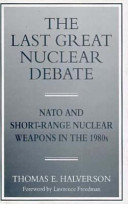
The Last Great Nuclear Debate
By - Halverson, Thomas E.
Floor
-
Floor 1
ISBN 10 - 0312126042
ISBN 13 - 9780312126049
Book Status
-
1 Qnty Available with us.
Subject
-
Nuclear arms control
Shelf No
-
15
common.call_no
-
327.174 HAL
common.physical_description
-
xvi, 219 pages ; 23 cm
Notes
-
Includes Bibliography and Index.